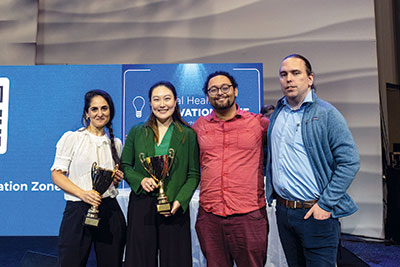APA’s 2024 Annual Meeting hosted an event that always pulls in the crowds: the Psychiatry Innovation Lab. At this competition, part of the meeting’s Mental Health Innovation Zone, three finalist teams presented their cutting-edge ideas to improve patient outcomes and advance psychiatric practice to a distinguished panel of judges, “Shark Tank”-style.
Initiated in 2016 by Nina Vassan, M.D., M.B.A.—then an APA Leadership Fellow—as an incubator for groundbreaking mental health solutions, the Psychiatry Innovation Lab aims to identify and support innovative ideas that can transform mental health care. This year, the event was led by Manu Suresh Sharma, M.D., chair of APA’s Committee on Innovation.
Here are the names and descriptions of this year’s finalists:
•
Empathy Rx aims to provide emotional skills training specifically designed for the health care sector. Its app aids providers in strengthening therapeutic relationships, improving treatment strategies, and reducing burnout.
•
Lucid.Care is a platform for diagnosing mental disorders and monitoring mental health. Its patient-facing mobile app gathers multimodal data to provide objective insights during psychiatric evaluations.
•
Health Innovated is a hospital bed management startup that uses technology to streamline clinical workflows and enhance patient outcomes.
The finalists pitched their ideas to an expert panel of judges, including Monika Roots, M.D., an adjunct assistant professor at the University of Wisconsin-Madison and a member of the APA Committee on Innovation; Marc Aafjes, M.S., CEO of Deliberate AI; Tristan Gorrindo, M.D., chief medical officer of Optum Behavioral Care and a practicing, board-certified child and adolescent psychiatrist; and Jean-Luc Neptune, M.D., M.B.A., CEO & chief medical officer at Suntra Modern Recovery.
Following the pitches, the judges provided detailed feedback and posed insightful questions to each team, leading to a lively and engaging discussion. For Empathy Rx, the conversation delved into its business strategy and market targeting. Although data compellingly showed that empathy levels peak during medical school and diminish as doctors advance in their careers, the judges pondered whether their primary focus should be on medical schools or early to mid-career doctors. They expressed curiosity about the challenges Empathy Rx might face in convincing busy doctors to participate in empathy training. Additionally, they questioned how the company plans to approach health care professionals with the sensitive suggestion that they might need to enhance their empathy for patients.
The judges’ interest in Lucid.Care revolved around how the company distinguishes itself in the crowded field of digital phenotyping, especially given the struggles many similar companies have faced. Questions about patient privacy and the incentives for organizations to adopt their product were at the forefront of the discussion. The judges also wanted to know how Lucid.Care plans to target private practices and whether such practices would be open to integrating its innovative solution.
Health Innovated’s pitch sparked curiosity about its data acquisition strategy for bed availability tracking. The judges sought clarity on whether hospitals would be willing to share these critical data. An audience member added to the discussion by asking about the timeline for hospitals to start using the Health Innovated system independently, without ongoing support from the company.
As the judges engaged with each team, their questions highlighted both the potential and the challenges of these innovative solutions. The exchange of ideas and insights not only provided valuable feedback to the finalists but also underscored the dynamic and transformative potential of the Psychiatry Innovation Lab.
After deliberation and an audience poll, the awards were announced. Empathy Rx received the Audience Choice Award, while Lucid.Care took home the Judges’ Choice Award. Winners received a cash prize, mentorship, and further opportunities to develop and implement their innovations.
For all finalists, participating in the Psychiatry Innovation Lab provided visibility, recognition, and networking opportunities, helping innovators gain traction and credibility in the mental health community.
The Psychiatry Innovation Lab is poised to return in 2025 at the APA Annual Meeting in Los Angeles. This exciting event will continue to bring together psychiatric leaders and experts from business, technology, medicine, and government, providing a platform for aspiring leaders in mental health technology. ■


